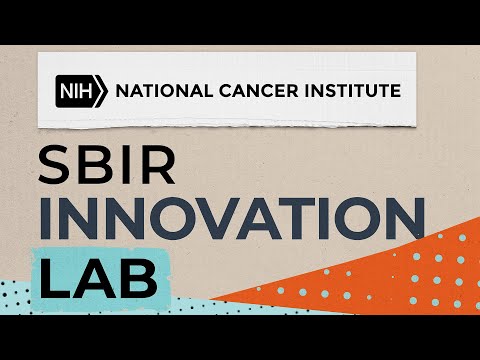Listen
Listen to this podcast to hear:
- How the Contract Solicitation works and differs from other funding opportunities
- The contract topic selection process
- Descriptions of this year’s therapeutic topics
Listen on the YouTube channel.
Episode Guests
Monique Pond, Ph.D.
Monique Pond, Ph.D., is a Team Leader and Program Director at the Small Business Innovation Research (SBIR) Development Center at the National Cancer Institute (NCI). She manages a portfolio of grants and contracts to small businesses developing novel cancer therapeutics, digital health technologies, and therapeutic devices.
Dr. Pond leads the Connecting Awardees with Regulatory Experts (CARE) program and other collaborative initiatives with the U.S. Food and Drug Administration (FDA) to assist small businesses in navigating the regulatory pathway for their technology. She initially joined the NCI SBIR Development Center in 2018 as a Science & Technology Policy Fellow with the American Association for the Advancement of Science.
Melissa Li, Ph.D.
Melissa Li, Ph.D., is a Program Director at the Small Business Innovation Research (SBIR) Development Center at the National Cancer Institute (NCI). She is focused on developing programs and initiatives that promote inclusion and equitable access to small business funding for entrepreneurs developing innovative cancer technologies. Currently, she leads the Mentor And Trainee Connections HUb Program (MATCHUP), a program that introduces top-tier talent to SBIR/STTR companies eligible for administrative supplements and co-leads the NCI’s efforts on the NCI SBIR/STTR Training and Entrepreneurship Program (STEP), which provides Phase I SBIR/STTR application preparation support and entrepreneurial training to small businesses.
Programs Mentioned in Episode
Explore the programs mentioned in this episode:
Episode Transcript
MONIQUE POND: Hello and welcome to Innovation Lab, your go to resource for all things biotech startups, brought to you today by the National Cancer Institute’s Small Business Innovation Research, or SBIR Development Center. Our podcast hosts interviews with successful entrepreneurs and provides resources for small businesses looking to take their cutting edge cancer solutions from lab to market. I'm Monique Pond, a Program Director and Team Lead here at NCI SBIR and today's host.
So, today I'm joined by NCI SBIR Program Director, Dr. Melissa Li, who will provide an overview of the contract topics featured in this year's NCI SBIR Contract Solicitation, one of the primary mechanisms that cancer technology and their breeders can pursue for funding for their projects. Topics range from therapeutics to digital health tools, so please be sure to listen to them all and find out if your innovation could be eligible for funding through this opportunity. Welcome, Melissa.
MELISSA LI: Thanks for having me.
MONIQUE POND: Thanks for your time today. Before we start discussing the topics in this year's solicitation, I'd like to talk a little bit about the funding opportunity itself. Can you share with our listeners today a little bit about how the Contract Solicitation works?
MELISSA LI: Sure. So I think I'll actually start out by talking about grants, which I'm sure most of the listeners are familiar with. So the Omnibus SBIR STTR Grants are investigator initiated. So this is where the small business brings their idea to the NIH. And there's three grant deadlines per year. For the Contract Solicitation, it's different from grants in that the topics are released once a year, so there's only one application cycle per year, it's SBIR only. And NCI has already identified the specific topics that we want to fund. So these topics are published with defined requirements and specific deliverables. And then the small business will come to us with their proposal of how they'll accomplish this. If they're selected for funding, the contracts are a legal agreement between the small business and the government with agreed upon requirements, deliverables, and a reporting schedule.
MONIQUE POND: So how does NCI develop the topics each year and how are new topics selected?
MELISSA LI: As some background, we're looking to find topics that we've determined to be important to support and want to stimulate research in. And so these topics could be new up and coming areas of research or areas that we have found to be underrepresented in our funding portfolio. So, to develop topics and select them, it goes through a nearly year-long process. And it starts with scientific experts within NCI who identify and propose potential topics, and they flesh out what you'll see in the solicitation. So, what the significant unmet need is, the underlying scientific premise, and what deliverables and activities are expected.
Then it goes through a round of peer review by NCI subject matter experts as well as SBIR experts. And then it goes through two more levels of approval by senior leadership at NCI. So, a long process to get the best topics.
MONIQUE POND: Thanks for explaining a little of that. Sounds like several levels of review and consideration each year for these topics. Well, now that we have some background on the funding opportunity and the process for selecting the topics, let's talk about the specific therapeutics topics this year. Take it away, Melissa.
MELISSA LI: Thanks. So, one of these topics is the novel delivery systems for RNA-based cancer vaccines. This topic is seeking for novel delivery platforms that would help accelerate the development of RNA-based cancer vaccines, like the title states. And the hope is that this will help answer some efficacy, safety, and manufacturability hurdles that are limiting current delivery systems. And the main goal is to develop this new delivery system and characterize their performance and assess feasibility of manufacturing scale up.
Another topic we have is the development of cancer immunoprevention agents. So, I know everyone's familiar with immunotherapies, but this topic is focused on prevention. So, the topic asked offers to identify well-defined high risk cohorts of some cancer indication. And then to develop novel immunopreventive vaccines or immunomodulatory drugs for cancer prevention and interception.
Then we have synthetic microbes, excluding oncolytic viruses, for immuno oncology therapies. This topic builds upon recent research on developing synthetic microbes as delivery systems for anti-cancer therapies or as adjuvants to enhance immuno oncology therapies. And the topic is focused on microbes, like probiotics and attenuated pathogenic bacteria, but not oncolytic viruses.
Another topic we have is the development of novel therapeutics for HPV related pre-cancer. This topic is in response to the fact that there is a lack of approved, non-surgical approaches for treating HPV related pre-cancers. So the goal of this topic is to develop therapeutics that would treat chronic HPV infections and/or cause regression of pre-cancers.
MONIQUE POND: Yes, thanks, Melissa. I just wanted to highlight that there's a lot of important work going on right now in the area of HPV related cancers and a lot of work for screening and prophylactic HPV vaccine approaches. And you know, hopefully this topic will help stimulate some entrepreneurs in a related but separate area and, you know, help develop new treatments for this patient population that can, you know, be used in strategies in conjunction with screening as well as the vaccine approaches.
MELISSA LI: Another topic we have is precision nutrition interventions to reduce cancer related symptoms. This one's all about helping patients with cancer who develop nutrition impact symptoms. This one is all about helping patients with cancer who develop nutrition impact symptoms from the cancer itself or cancer treatment. And these might affect food intake, digestion and absorption, among many other symptoms, which then can ultimately impact cancer outcomes. The goal of this topic is to develop nutritional interventions that will alleviate these symptoms.
MONIQUE POND: Great. And it sounds like this topic is open to a variety of symptoms related to malnutrition, so an offerer could propose to look at a particular intervention and the symptom, and include appropriate outcome measures to measure the efficacy of that. But it sounds pretty, pretty open, is that correct?
MELISSA LI: Yeah, I think some examples would be, you know, specific meals. You know, they're not looking specifically for, like, a magical pill, but actual nutritional meals that cancer patients with cancer can eat and get all the nutrition that they need from it. Another topic we have is drug loaded carrier particles for improved oral delivery for colon cancer prevention. So, patients with inflammatory bowel diseases are at higher risk of developing colorectal cancer and prevention is really key in this population. So the purpose of this contract topic is to support the development of carrier particles for oral drug delivery in colon cancer prevention. And the goal is that the carrier particles could potentially enhance efficacy and/or reduce toxicities of the drugs.
Next, we have antibody drug conjugates as radiopharmaceutical theranostics for cancer. So, antibody drug conjugates, a super hot area right now, as therapies. The goal of this topic is actually to improve upon these ADC's by labeling them with radionuclides that would enable them to be their agnostic, so, both an imaging diagnostic along with further therapeutic capabilities.
MONIQUE POND: Awesome. So, it sounds like along with the diagnostic portion, they would still retain the chemical therapeutic of, you know, the traditional ADC, but then also add the other mechanism of action thereof, the radio nucleotide for therapy as well, so almost a three pronged approach for an ADC.
MELISSA LI: Exactly. Yeah, right.
MONIQUE POND: Well, thank you for joining us today, Melissa.
MELISSA LI: Thanks for having me.
MONIQUE POND: Sure. So, in this episode, we covered all of the therapeutics related topics, but in our next episode, we will continue exploring the other FY 2025 NCI SBIR Contract Solicitation topics in a non-therapeutics focused segment. You can also learn more about this funding opportunity by periodically checking the current solicitation on our website as well as attending associated webinars. Thanks, everyone.
This was Monique Pond from NCI SBIR. Please join us again for the next installment of NCI SBIR Innovation Lab, and subscribe today, wherever you listen. If you have questions about cancer or comments about this podcast, you can e-mail us at nciinfo@nih.gov or call us at 800-422-6237, and please be sure to mention Innovation Lab in your query. We are a production of the US Department of Health and Human Services, National Institutes of Health, National Cancer Institute. Thanks for listening, everyone.


